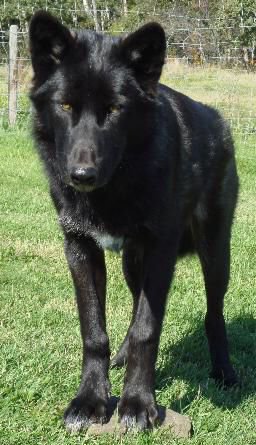My dog is amazing. I think I'll breed it.
By Jennifer Stoeckl, MAT - Dire Wolf Project CEO, Dec. 17, 2024
Yesterday, I had a fascinating phone conversation with a young professional counselor who owns a wolf dog he passionately claims is the best dog he’s ever had.
To him, this beautiful animal is devoted, loyal, and full of life—the ideal companion.
His wolf dog thrives at the dog park, where he plays joyfully yet stands his ground when challenged by other dogs.
With measured restraint and respectful confidence, his wolf dog communicates that he won’t tolerate gruff from any dog.
Yet his dog is loyal to him and his children.
It’s easy to see why this man holds his dog in such high regard, believing wholeheartedly that there is no better canine companion.
So naturally, he wants more dogs just like him—a common desire for many owners of extraordinary animals.
But herein lies the problem.
He operates under the mistaken belief that breeding a dog will produce puppies just like their parents.
The reality is far more complex, especially when it comes to wolf dogs, whose genetics are often a mixed bag of breeds.
Wolf dogs are typically a blend of wolf content and various large, wolf-like domestic breeds, such as the Siberian Husky, German Shepherd, and Alaskan Malamute, among others.
The result is an unpredictable combination of traits, both physically and temperamentally.
When I asked this man if he had conducted a DNA test on his wolf dog, he admitted that he hadn’t.
It was clear that while he loved his companion deeply, he lacked a full understanding of what his wolf dog truly was.
He wanted to know if the Dire Wolf Project breeds wolf dogs— seeking a female to match his male.
I explained that we do not breed wolf dogs and have no intention of promoting wolf dog breeding.
Unlike wolf dogs, the Dire Wolf Project focuses on 100% domesticated dogs that hold the look of the wild wolf without the challenges associated with wolf content.
This revelation left him wondering where he could find other wolf dog breeders in the northwest.
Unfortunately, I couldn’t offer him any guidance there, as I do not participate in the wolf dog breeding community.
But the conversation raised significant concerns.
This man seemed genuinely unaware of the complexities and responsibilities involved in breeding dogs, let alone wolf dogs.
His belief that two beautiful, well-behaved wolf dogs would naturally produce equally superior offspring is dangerously naive.
In reality, genetics are far from predictable.
Any number of temperament combinations can emerge from such a pairing.
Some puppies might inherit confidence and loyalty, while others could be shy, dominant, aggressive, or overly independent.
These are not traits to take lightly,
especially in a wolf dog.
What if the female has twelve or thirteen puppies?
Is he prepared to place every single one in responsible, knowledgeable homes?
Or is he only considering the handful of friends and family who expressed interest?
This is a critical question that many inexperienced breeders fail to ask themselves.
If he’s unable to find appropriate homes for the puppies, what happens to them?
How does he know the families he places them with are equipped to handle the unique challenges of wolf dog ownership?
The harsh truth is that most wolf dogs end up living tragic lives.
The statistics are sobering.
According to a 2018 Colorado Public Radio article by Rachel Ramberg, an estimated 150,000 to 250,000 wolf dogs are born in the U.S. each year.
Even more devastating, around 200,000 wolf dogs are euthanized annually—a staggering 90-95% of them by the time they reach two years old.
This heartbreaking cycle stems from a lack of awareness and preparation.
People are often enchanted by the idea of owning a wolf-like animal without understanding the reality.
Many wolf dogs are misunderstood, abused, abandoned, or confined for their entire lives.
This is not a fate that any dog deserves, and yet it happens all too frequently.
The Dire Wolf Project stands firmly
against wolf dog breeding.
We believe in a better path—one that honors the beauty and shadow of the wolf without the complications of wolf content.
Our dogs are 100% domesticated and bred with careful consideration for temperament, health, and genetic diversity.
Unlike the uncertain outcome of wolf dog breeding, our breeding practices produce consistent and predictable temperament results.
For those who want a dog that embodies the majesty of the wolf but thrives in a modern family setting, the Dire Wolf Project offers exactly that.
Our dogs are not only stunningly beautiful but also loyal, calm, gentle, loving companions.
They are everything people hope for in a wolf-like dog without the trauma or unpredictability that comes with wolf content.
To the counselor I spoke with and others who may share similar dreams:
I understand the love you feel for your wolf dog.
It’s easy to be captivated by their beauty, strength, and spirit.
But breeding animals—especially wolf dogs—is not a decision to be made lightly.
It comes with immense responsibility and consequences that can last a lifetime, for both the puppies and the families who take them in.
If you want a loyal, wolf-like companion that is predictable, safe, and bred with care, the Dire Wolf Project is here to help.
You’ll find the dog of your dreams—
a shadow of the wild wolf, without the heartbreak.
Let’s make informed choices. For the love of dogs.
I have updated the Future Litters Page with new banners.
Click the link below to see how they turned out:
https://direwolfdogs.com/dogs-for-sale/future-litters/
Jennifer Stoeckl is the co-founder of the Dire Wolf Project, founder of the DireWolf Guardians American Dirus Dog Training Program, and owner/operator of DireWolf Dogs of Vallecito. She lives in the beautiful inland northwest among the Ponderosa pine forests with her pack of American Dirus dogs.